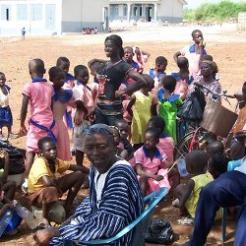Niki May Young believes the need for international aid is greater than the need for localism.
The students are revolting. School building is being cancelled. UK charities are closing down. And people are losing their jobs. Frustration and anger at cuts are understandable, particularly when they appear so severe and affect so many. So why has the government chosen to increase spending on international aid?
The decision of the coalition to stick by the UK’s long-standing commitment to increase international spending has faced mixed reaction, with many expressing distaste at the increased international spending announced in the recent spending review.
This week the Department for International Development announced where £10m of a pledged £500m of spending on malaria prevention will go – to Ghana, where there are three million suspected cases of malaria reported every year.
It’s easy to get caught up in the figures, to cry ‘localism!’ in a bid to protect ‘your own’ and to forget the immeasurable privilege that we have, simply for being born in the UK.
I am trustee of a Brighton-based charity which raises funds to build schools in Africa and we battle on a regular basis to get people to understand and appreciate why we work so hard to raise funds for projects so far away. I have to admit that I’m not sure if I would have become involved in the charity had it not been for the fact that my mother was born and raised in Kenya.
But having worked for the charity for well over two years now, I know that my efforts are justified after visits to The Gambia and Ghana to see where our money goes first-hand.
Just two weeks ago I was in Ghana for the grand opening of a school that my charity, PassingItOn, had funded. It was a real moment of victory and pride, as we had helped to build a centre that the rural community of Akumadan and its surrounding precinct could use to further itself, providing an education for 300 infants.
But the experience of visiting our projects is always tainted with a great deal of sadness. Not based on the ‘poor people of Africa’, because those I have encountered don’t live terrible lives, they live fulfilling, community-centric, happy lives in the main. But because of the legacy from an all too recent colonisation, which saw new boundaries drawn and a new way of life born. Governments of African countries, infants themselves, struggle to provide the basic amenities for their people.
Healthcare and education are not catered for like they are in the UK, there are no tax systems in place that can cope with the unique sole-trader commerce of street-side sellers or farming communities that still trade rather than sell their goods, and work on goodwill.
On my recent visit to Ghana I personally witnessed two suspected cases of malaria from the children in our school, was informed that two of the local pastor’s children were in hospital with the disease, and saw the pitiful figure of a nine-month-old baby edge slowly better after being hospitalised with the same.
Of course it is important that we rally to protect our local charities and help people in our own communities. But we must not lose sight of the difficulties faced by others in different locations, simply because of their geography. The UK's standing as a world leader in the battle against malaria is something to be revered, not disdained.
Niki May Young is website editor of Civil Society Media and trustee of PassingItOn









